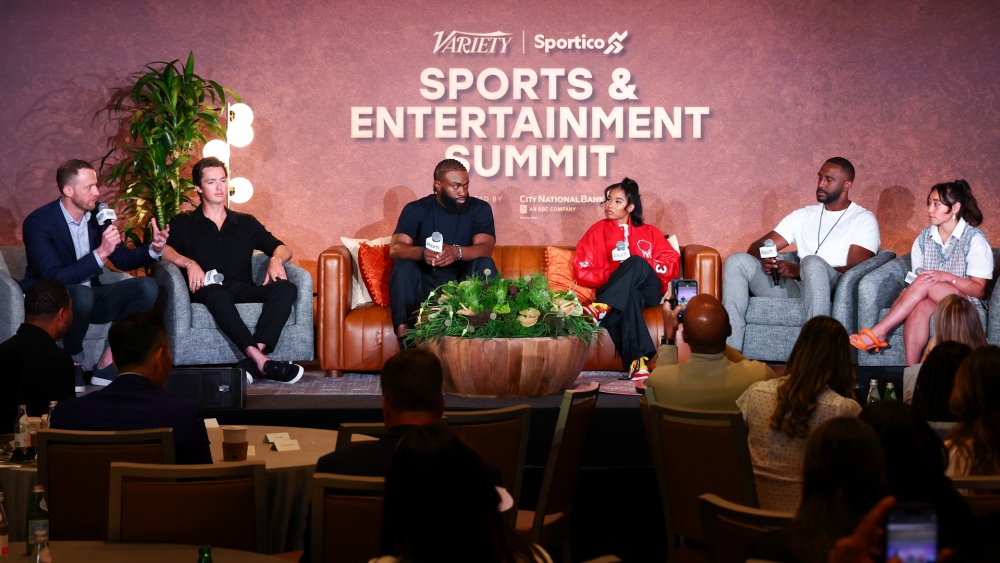
“The ball does stop dribbling at some point,” said Patrick Patterson, former NBA star and co-founder of Undisputed Productions. At Variety and Sportico’s Sports and Entertainment Summit, he explained that the game can end at any second, so as an athlete, you need to be able to pivot to another career path. “Maybe before you’re even prepared, maybe before you’re even ready. But you need to have something that you’re equally passionate about to fall back on.”
During the “Extending Success Beyond the Game” panel, professional and Olympic athletes from across the board sat down to discuss how they take their talents off the beam, slope or court, and into places where they can be more than an athlete, whether that be on the screen, in charitable organizations, in endorsing brands or creating their own.
Jaylen Brown, Patrick Patterson, Katelyn Ohashi, Jordan Chiles and Scotty James sat down with moderator Todd Burach, SVP at City National Bank to discuss opportunities after a career in professional sports.
Katelyn Ohashi, “Extending Success Beyond the Game” at Variety and Sportico’s Sports and Entertainment Summit (JC Olivera/Variety via Getty Images)
Variety via Getty Images
“It was the first time I realized I was not a gymnast, and it would not be my life path forever,” said UCLA All-American gymnast Katelyn Ohashi about an injury she sustained when she was only 16. Right now, she’s building a leotard company, combining her love of gymnastics and design. “You hear ‘more than an athlete’ constantly, but it doesn’t happen until push comes to shove.”
Though, it’s not always about athletes getting ready to make a change after they’ve outgrown a sport. Sometimes, they must extend their reach beyond the court while they’re still on it.
“As an athlete, you have most of your influence right now,” said Boston Celtics star Jaylen Brown. As VP of the National Basketball Players Association, Brown tells rookies to think about a post-career plan while they’re still in the game. That way, they can utilize their leverage and voice to create a path for them once they leave the league. “Cause when you’re done, you’re done. Then, most people tend to not care and be less interested in you.”
But that ability to multitask wasn’t always so welcomed.
“For me, coming into the league, that was kind of my thing,” Brown added. “It was frowned upon to have multiple things going on when I got drafted. There was a GM that came out and said, ‘Maybe we won’t take him because he has too many interests outside of basketball.’ But in hindsight, eight years later, it’s more common to see players coming in as a CEO, activist, et cetera.”

Jaylen Brown and Jordan Chiles, “Extending Success Beyond the Game” at Variety and Sportico’s Sports and Entertainment Summit (JC Olivera/Variety via Getty Images)
Variety via Getty Images
“For us, we had to choose, so having the NIL was something pretty significant,” said Olympic gymnast Jordan Chiles on the days when college athletes were not allowed to make money off of their name, image and likeness. For gymnasts like Chiles and Ohashi, NIL gives them an opportunity to build a brand around themselves early on, creating a jumping off point for after their college career.
And whether they realized it or not, being an athlete conditioned them to be team-oriented, rely on others for support and get stronger under pressure — all valuable skills needed to run a company, manage a personal brand or find a voice in activism.
“I recently just bought my first house in Texas, and as a 22-year-old that’s the biggest thing you can do in your life,” said Chiles. “I can say competing on the biggest stage is stressful, but no, buying a house was more stressful. Realizing that everything I’ve learned in my sport can be applied to my daily life has helped tremendously.”
“Juggling between doing flips and spins and trying to invest in the X Games was relatively stressful, but it was really exciting,” echoed Olympic snowboarder Scotty James, who just today was revealed to be joining X Games as an investor and brand advisor. “I enjoy the adrenaline, and I think I like the curiosity of what it can be, and I think that’s very relative to sport. I really believe in the vision and the future of the X Games, and I do the same when I go up on the mountain.”

Jaylen Brown, “Extending Success Beyond the Game” at Variety and Sportico’s Sports and Entertainment Summit
Variety via Getty Images
It can be hard for athletes to not invest in something outside of their sport. When given a platform because of a jersey, NIL or talent itself, it is almost a no-brainer for some athletes to give back to those who look up to them, the community that raised them or even just themselves by exploring other passions.
“I learned to walk by chasing after a basketball,” said Brown. Throughout his career, he has spoken at universities about the importance of tech and education, was named an MIT Media Lab Fellow and collaborated with programs and foundations to provide mentorship to students and fight for education and income equality. He even runs a YouTube channel that gives a glimpse into his off-season life.
“For me, I still have this innate fear that if I don’t use my platform to give back, to some extent, I feel like it will be taken away from me,” he said. “It’s an obligation for me to use it, that’s just how I was raised.”














